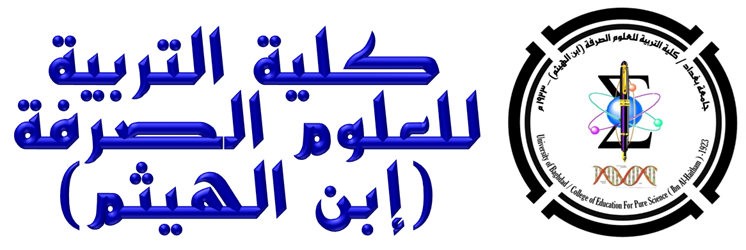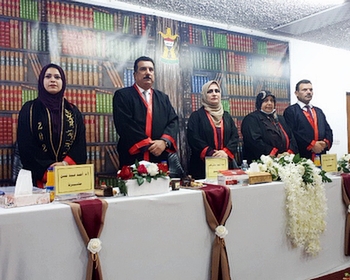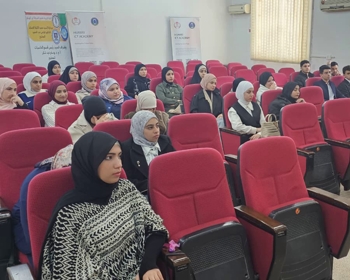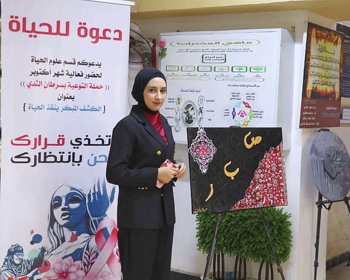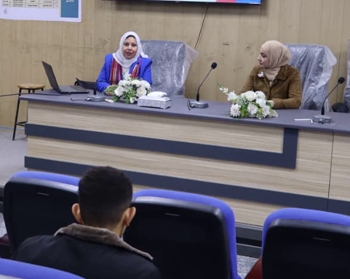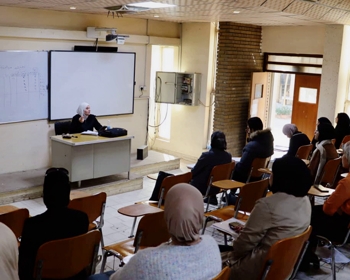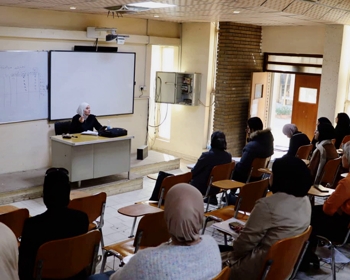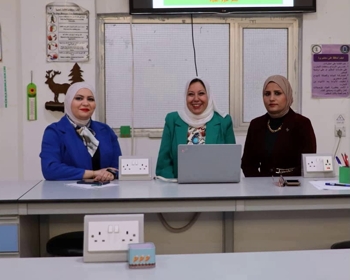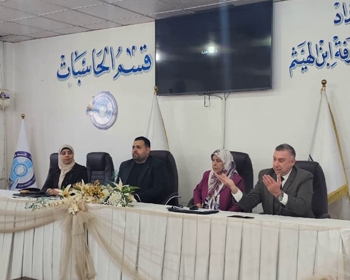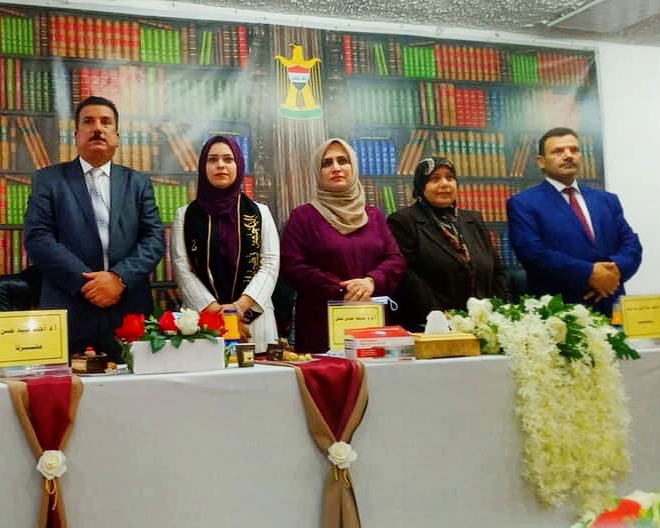 ناقش قسم علوم الحياة في كلية التربية للعلوم الصرفة (ابن الهيثم) رسالة الماجستير ( فاعليـة التـدريس وفقـاً لأنشطـة STEM في تحصيـل طالبات الصـف الأول متـوسط في مادة العلوم وتفكيرهـن التأملي ) في تخصص طرائق تدريس علوم الحياة للطالبة ( زهراء حازم حسن) التي انجزتها تحت اشراف التدريسي في القسم (أ. د . أحمد عبيد حسن) ونوقشت من قبل أعضاء لجنة المناقشة المبينة أسمائهم فيما يأتي :
ناقش قسم علوم الحياة في كلية التربية للعلوم الصرفة (ابن الهيثم) رسالة الماجستير ( فاعليـة التـدريس وفقـاً لأنشطـة STEM في تحصيـل طالبات الصـف الأول متـوسط في مادة العلوم وتفكيرهـن التأملي ) في تخصص طرائق تدريس علوم الحياة للطالبة ( زهراء حازم حسن) التي انجزتها تحت اشراف التدريسي في القسم (أ. د . أحمد عبيد حسن) ونوقشت من قبل أعضاء لجنة المناقشة المبينة أسمائهم فيما يأتي :
-
أ.د. فاطمة عبد الأمير (رئيساً)
-
أ.م.د. شيماء عباس شمل (عضواً)
-
أ.م.د. حسين سالم مكاون (عضواً)
-
أ.د. أحمد عبيد حسن (عضواً ومشرفاً )
ويهدف البحث الحالي التعرف على فاعلية أنشطة STEM في تحصيل طالبات الصف الأول متوسط في مادة العلوم وتفكيرهن التأملي .
يهدف البحث الحالي التعرف على فاعلية التدريس وفقاً لأنشطة STEM في تحصيل طالبات الصف الأول متوسط في مادة العلوم وتفكيرهن التأملي , وللتثبت من هدف البحث وضعت الباحثة الفرضيتين الصفريتين الأتيتين :
-
لا يوجد فرق ذو دلالة أحصائية عند مستوى دلالة (05) بين متوسط درجات طالبات المجموعة التجريبية اللاتي يدرسن مادة العلوم وفقاً لأنشطةSTEM , وبين متوسط درجات طالبات المجموعة الضابطة اللاتي سيدرسن المادة نفسها بالطريقة الاعتيادية في اختبار التحصيل البعدي.
-
لا يوجد فرق ذو دلالة أحصائية عند مستوى دلالة (05) بين متوسط درجات طالبات المجموعة التجريبية اللاتي يدرسن مادة العلوم وفقاً لأنشطة STEM وبين متوسط درجات طالبات المجموعة الضابطة اللاتي يدرسن المادة نفسها بالطريقة الاعتيادية في التفكير التأملي البعدي .
استعملت الباحثة التصميم التجريبي ذا الضبط الجزئي لمجموعتين متكافئتين مستقلتين تجريبية وضابطة , وقد أختيرت عينة البحث قصدياً , من طالبات الصف الأول متوسط (متوسطة الشيماء للبنات ) التابعة للمديرية العامة لتربية بغداد / الرصافة الثانية , للعام الدراسي ( 2019-2020 ) , إذ بلغت العينة (77) طالبة , وقد وقع الاختيار العشوائي على شعبة (ه) المؤلفة من (39) طالبة لتمثل المجموعة التجريبية وشعبة (أ) المؤلفة من (38) طالبة لتمثل المجموعة الضابطة , كافأت الباحثة مجموعتي البحث في متغيرات (العمر الزمني محسوباً بالأشهر , واختبار الذكاء ( رافن Raven) , واختبار المعلومات السابقة لمادة العلوم , ومقياس التفكير التأملي ) , وتم إعداد أداتين هما الأختبار التحصيلي ومقياس التفكير التأمـلي وأعدت الباحثـــــة اختبــــــــــــاراً تحصيلياً للوحدات (3,2,1) من كتاب مــــادة العلوم الفصل الدراسي الثاني للصف الأول متوسط , إذ تألف الاختبار التحصيلي من (30) فقرة من نوع الاختيار من متعدد بأربعة بدائل , أما مقياس التفكير التأملي فقد تألف من (30) فقرة , وتم التحقق من صدق الأداتين بعد عرضهما على مجموعة من المحكمين أذ تم تحليل البيانات ومعالجتها إحصائياً باعتماد البرنامج الإحصائي (SPSS) .
أشارت النتائج إلى وجود فاعلية لأنشطة STEM في تحصيل مادة العلوم والتفكير التأملي لطالبات الصف الأول متوسط لصالح المجموعة التجريبية
وخلصت الطالبة الى التوصيات الاتية :
-
تنمية الاتجاهات الايجابية نحو توظيف الأدوات الالكترونية الحديثة الخاصة بأنشطة STEM في التعليم لدى المدرسين والطلبة .
-
الاهتمام بمهارات التفكير التأملي والعمل على تطبيقها عن طريق دعم المنهاج بالمشكلات والمواقف التي تساعد في تنمية التفكير التأملي .
The effectiveness of teaching According to STEM Activities in Achievement of First grade / Secondary school students in the subject of science and
their Reflective Thinking
Zahraa Hazim Hasan Al-jburi
Prof. Dr. Ahmed Obaid Hasan Alsaadi
Research objective to recognize (( the effectiveness of teaching based on STEM activities in achievement grade 1 students in science and their reflective thinking ))
Abstract :
Research objective to recognize (( the effectiveness of teaching based on STEM activities in achievement grade 1 students in science and their reflective thinking )) To establish the objective of the research, the researcher developed the following the two hypotheses :
-
There is no statistically significant difference at the level of indication (0.05) between the average grades of the group’s experimental students will be studied according to STEM activities and the average grade of the control group students who will be studying in the normal way in the achievement of science material.
-
No difference Statistically significant at an indication level (0.05) between the average grades of the group’s experimental students to be studied according to STEM activities and the average grade of the control group students to be studied in the usual way of reflective thinking.
The researcher used the experimental design with partial control of two equal , independent , experimental and controlled groups , and the sample research was selected for the first grade intermediate-grade students (Al- Shaimaa / secondary school for girls) of the General – Directorate of Baghdad Education , if reaches (77) students of (2019-2020) school year , The random selection was made on the division (E) consisting of (39) students to represent the experimental group and the division (a) consisting of (38) students to represent the control group.
The researcher paritied the two group of research in variables (the chronological age calculated in months, The intelligence test ( Rafen) , and the test of previous knowledge of science , and the reflective thinking scale) , and two tools were prepared : The achievement test and the reflective thinking scale , and the researcher prepared an achievement test for the units (1,2,3) of the Science textbook for the second semester / first grade , as the achievement test consisted of (30) items of the multiple – choice type with four alternatives , As for The scale reflective thinking consisted of (30) items, and the validity of the two tools was verified after presenting them to a group of arbitrators, As the data were analyzed and statistically processed by the approval of the Statistical Program (SPSS) .
The Results indicated that STEM activities are effective in achievement material science and reflective thinking for grad 1 students secondary school for the experimental Group.
-
Recommendations
-
Development of positive trends towards employing modern STEM electronic tools in education for teacher and student .
-
Take care of the reflective thinking skills and working on development and evolution them through supporting the curriculum with problems and situations that help in developing reflective.
